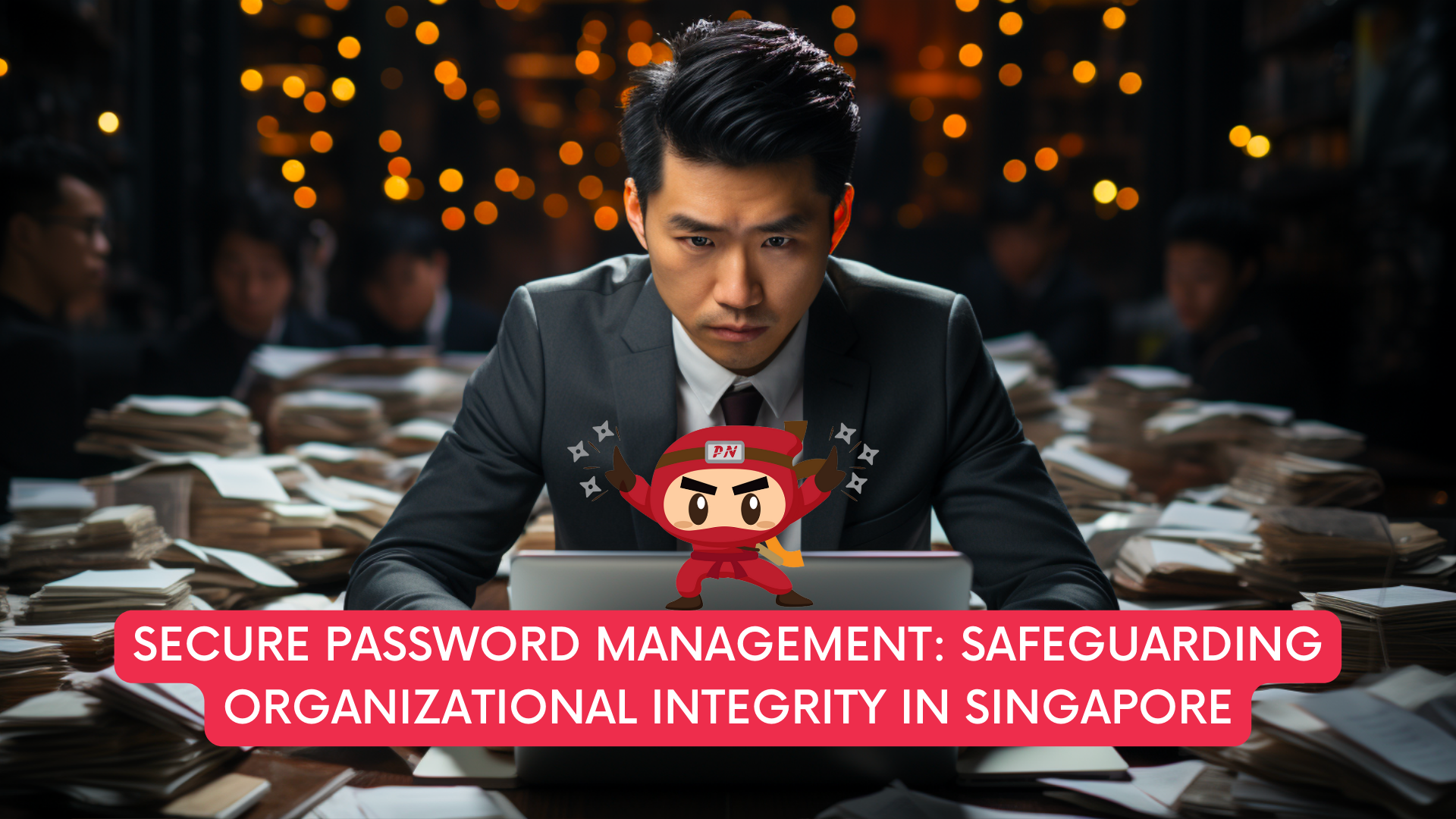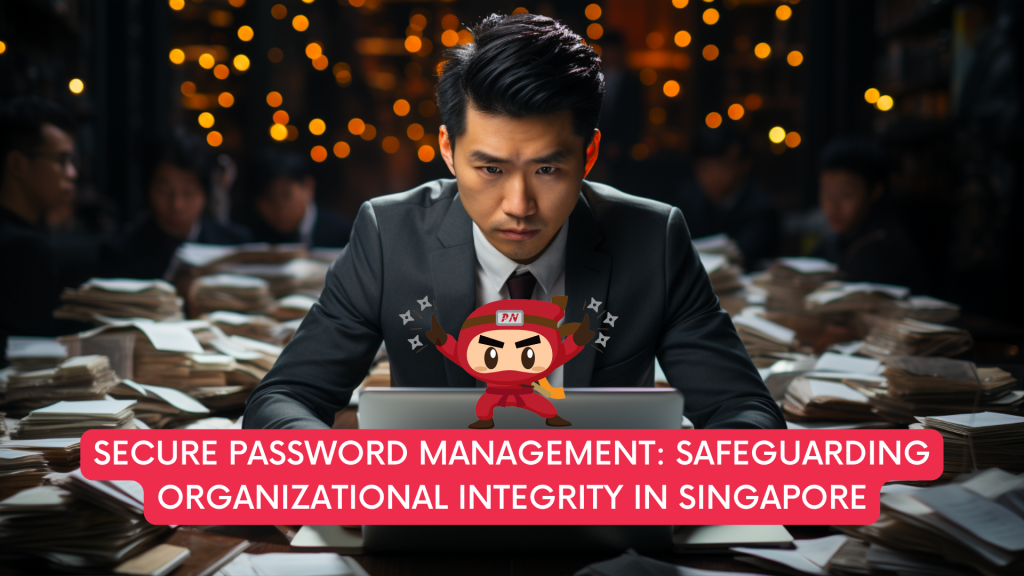KEEP IN TOUCH
Subscribe to our mailing list to get free tips on Data Protection and Cybersecurity updates weekly!







In today’s digitized world, where information and communication flow seamlessly across various platforms, the importance of robust cybersecurity practices cannot be overstated. Passwords, serving as the first line of defense against unauthorized access, form a crucial aspect of this defense.
For organizations in Singapore, where the reliance on technology is deeply ingrained, effective password management is not just a best practice; it’s a necessity. This article explores the significance of password management for organizations in Singapore and provides actionable insights to enhance their cybersecurity posture.
Singapore, known for its technological advancement and digital infrastructure, has become a prime target for cybercriminals seeking to exploit vulnerabilities in organizational systems. The government’s efforts to promote a secure digital environment are evident through initiatives like the Cybersecurity Act and the development of the Cybersecurity Masterplan. These measures emphasize the need for organizations to prioritize their cybersecurity strategies, including robust password management.
Weak passwords remain one of the most common entry points for cyberattacks. Despite advancements in cybersecurity, many individuals still opt for easily guessable passwords or reuse the same password across multiple accounts. Hackers can exploit this lax approach to gain unauthorized access to sensitive systems, resulting in data breaches, financial losses, and reputational damage.
1. Complexity and Length: Encourage the use of complex passwords that combine uppercase and lowercase letters, numbers, and special characters. Longer passwords are generally more secure than shorter ones.
2. Password Diversity: Emphasize the importance of using unique passwords for each account or system. This prevents a breach in one account from compromising multiple others.
3. Password Managers: Introduce employees to password manager tools that generate and store complex passwords securely. These tools alleviate the burden of remembering multiple passwords while ensuring strong protection.
4. Multi-Factor Authentication (MFA): Advocate for the implementation of MFA wherever possible. This adds an extra layer of security by requiring users to provide additional verification, such as a one-time code sent to their mobile device.
5. Regular Updates: Enforce a policy of regular password updates to prevent stagnant passwords from becoming vulnerable over time.
6. Education and Training: Conduct cybersecurity awareness training sessions for employees to educate them about the risks of weak passwords, phishing, and other cyber threats.

Singapore’s Personal Data Protection Act (PDPA) mandates that organizations take appropriate measures to protect personal data from unauthorized access. Weak password practices could lead to non-compliance and potential legal repercussions.
Implementing strong password management aligns with the PDPA’s data protection principles and demonstrates an organization’s commitment to safeguarding sensitive information.
Implementing a password management solution can significantly enhance an organization’s cybersecurity posture. These tools offer several benefits:
1. Secure Storage: Password managers store passwords in encrypted databases, protecting them from unauthorized access.
2. Automatic Generation: These tools can generate complex passwords for various accounts, eliminating the need for users to create and remember them.
3. Synchronization: Password managers often offer synchronization across devices, ensuring users have access to their passwords securely.
4. Centralized Control: IT administrators can manage and monitor password security across the organization, enforcing strong password policies.
Organizations in Singapore may face challenges while implementing effective password management practices. Resistance to change, concerns about accessibility, and the learning curve associated with new tools are common hurdles. To overcome these challenges:
1. Education: Emphasize the benefits of strong password management and provide training to ensure employees understand the importance of the initiative.
2. User-Friendly Tools: Choose password management solutions that are user-friendly and intuitive, minimizing the learning curve for employees.
3. Communication: Clearly communicate the rationale behind adopting password management tools and the steps employees need to take.

In a digital era where data breaches can have profound consequences, organizations in Singapore must prioritize robust cybersecurity practices. Effective password management stands as a fundamental pillar of a strong defense against cyber threats.
By emphasizing the importance of complex and unique passwords, promoting the use of password management tools, and fostering a culture of cybersecurity awareness, organizations can significantly reduce their vulnerability to cyberattacks.
By securing the digital frontlines through password management, Singaporean organizations can continue to harness the benefits of technology while safeguarding their integrity and the trust of their stakeholders.
Your appointed DPO can work with you on your PDPA compliance, ensuring that there will be policies in place to make sure that the handling of personal data is PDPA compliant.
A Data Protection Officer (DPO) oversees data protection responsibilities and ensures that organisations comply with the Personal Data Protection Act (PDPA). Furthermore, every Organization’s DPO should be able to curb any instances of PDPA noncompliance as it is the officer responsible for maintaining the positive posture of an organisation’s cybersecurity.
DPOs complement organisations’ efforts to ensure that the organisation’s methods of collecting personal data comply with the PDPA. It also ensures that policies are set in place to make sure that there will be no instances of data breaches in the future.
Don’t wait any longer to ensure your organisation is PDPA compliant. Take our free 3-minute PDPA Compliance Self-audit checklist now, the same “secret weapon” used by our clients to keep them on track. Upon completion, we will send you the results so you can take the necessary action to protect your customers’ data. Complete the free assessment checklist today and take the first step towards protecting your customers’ personal data.